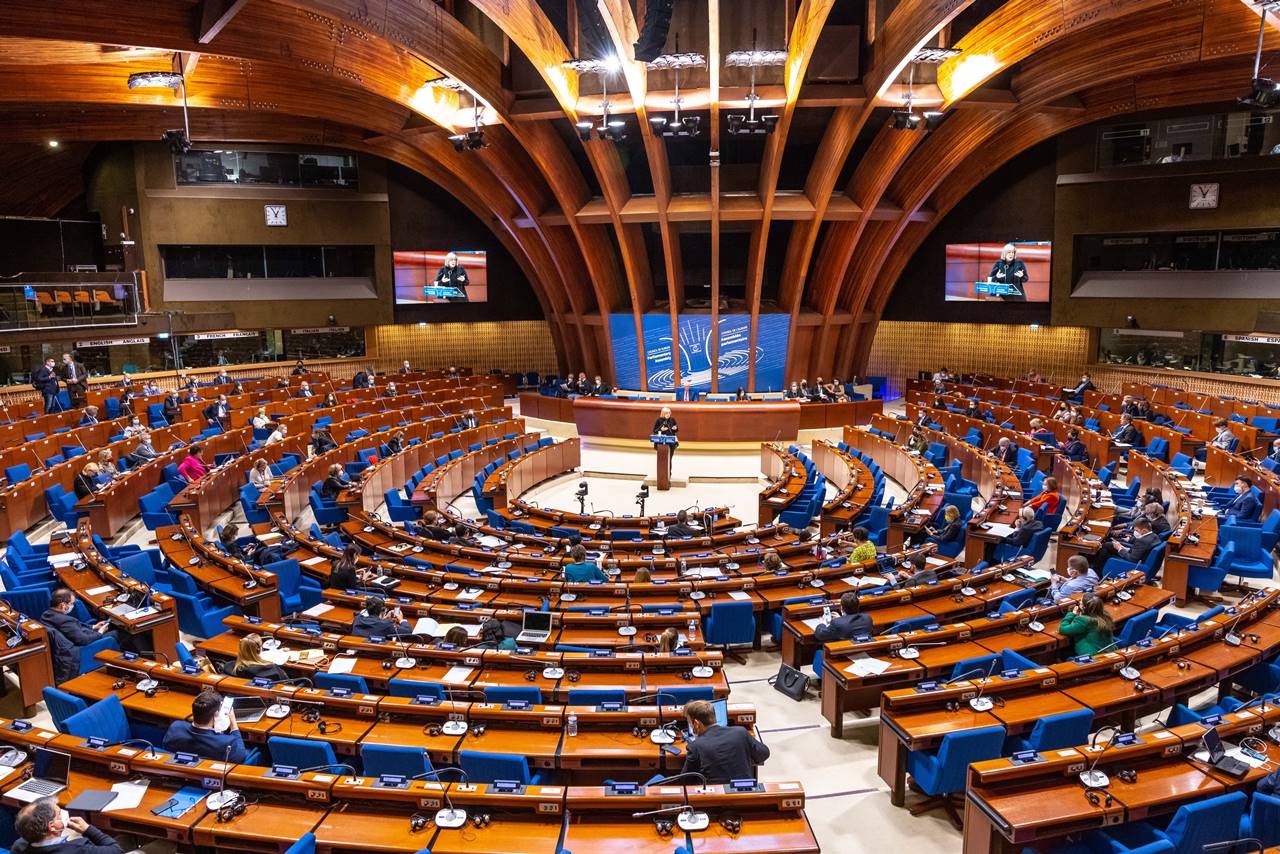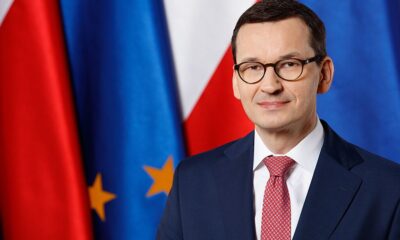Politics
Elections 2024, President Metsola “Vote. Do not let someone else choose for you”
The Key Issues in the European Parliament Elections 2024
Elections 2024 – The European Parliament Elections 2024 are just around the corner, and it’s important to be informed about the issues that will be at the forefront of the election. From climate change to immigration policies, this article provides an overview of the key topics that will shape the election and impact the future of Europe, plus, an important entry on why looking at the managing of fundamental rights could probably be one of the most important issues to look at when looking at the programs of the different parties, even if inclusion in the program does not guarantee that once in power they will not change their views…
But anyway, before we start, here is what current President of the European Parliament, Roberta Metsola, said:
“The European Union is evolving continuously. The world is changing and we must change with it. We need reform. We cannot be afraid of change. The EU is not perfect. We must embrace it as we keep listening, keep explaining and keep delivering.
I encourage everyone to recapture the sense of hope and possibility that the European Union offers. To vote. Do not let someone else choose for you. Be part of the largest democratic exercise in Europe.”
The Future of the European Union.
One of the key issues at stake in the European Parliament Elections 2024 is the future of the European Union itself. With the ongoing challenges and the rise of movements across Europe who want less EU interference in national affairs, the election will be a crucial moment for determining the direction of the EU. Issues such as EU integration, the role of the European Commission, and the balance of power between member states will all be hotly debated. The outcome of the election will have significant implications for the future of Europe and its place in the world.
Immigration and Border Control.
Immigration and border control will be another key issue in the European Parliament Elections 2024. The ongoing refugee crisis and the influx of migrants into Europe have led to a heated debate about how to manage borders and control immigration. Some parties advocate for stricter border controls and limits on immigration, while others argue for more open borders and greater support for refugees and migrants. The outcome of the election will have a significant impact on the future of immigration policy in Europe.
Climate Change and Environmental Policies.
Climate change and environmental policies will be a major topic in the European Parliament Elections 2024. The European Union has set ambitious goals to reduce greenhouse gas emissions and transition to a more sustainable economy. However, there are still debates about the best way to achieve these goals and how to balance environmental concerns with economic growth. The election will determine the direction of EU environmental policies and its role in global efforts to combat climate change.
Economic Growth and Job Creation.
Another key issue in the European Parliament Elections 2024 is economic growth and job creation. The COVID-19 pandemic has had a significant impact on the European economy, with many businesses struggling to stay afloat and unemployment rates rising. The election will determine the policies and strategies that will be put in place to support economic recovery and job creation in the EU. This includes debates about taxation, trade agreements, and investment in key industries such as technology and renewable energy.
Digital Transformation and Data Privacy.
Digital transformation and data privacy are also key issues in the European Parliament Elections 2024. With the increasing use of technology in all aspects of life, including government and business, there is a growing concern about data privacy and security. The election will determine the policies and regulations that will be put in place to protect citizens’ personal data and ensure that companies are held accountable for any breaches. Additionally, the election will address the need for digital transformation in various sectors, including healthcare, education, and public services, to improve efficiency and accessibility while also addressing concerns about data privacy and security.
Why Fundamental Rights Should Be a Priority in the European Parliament Elections
Fundamental rights are the basic human rights that every person is entitled to, regardless of their race, gender, religion, or any other characteristic. As citizens of the European Union, we have the opportunity to vote in the European Parliament elections and ensure that our leaders prioritize and protect these rights for all. Let’s make our voices heard and advocate for a just and equitable society.
What are fundamental rights?
Fundamental rights are the basic human rights that every person is entitled to, regardless of their race, gender, religion, or any other characteristic. These rights include the right to life, liberty, and security of person, freedom of expression and religion, the right to a fair trial, and the right to education and healthcare. They are the foundation of a just and equitable society and must be protected for all.
The importance of fundamental rights in a democratic society.
In a democratic society, fundamental rights are essential for ensuring that every individual is treated fairly and with dignity. These rights provide a framework for protecting individuals from discrimination, oppression, and abuse of power. Without fundamental rights, there can be no true democracy, as the basic freedoms and protections that allow citizens to participate in the democratic process would be absent. It is therefore crucial that fundamental rights are prioritized and protected in the European Parliament elections, to ensure that all citizens can live in a just and equitable society.
The impact of the European Parliament on fundamental rights.
The European Parliament plays a crucial role in protecting and promoting fundamental rights across the European Union. Through legislation, oversight, and advocacy, the Parliament has the power to ensure that these rights are respected and upheld by member states and institutions. In the upcoming elections, it is important to elect leaders who prioritize fundamental rights and are committed to defending them for all citizens, regardless of their background or status. By doing so, we can build a stronger, more inclusive Europe that values the dignity and worth of every individual.
Examples of fundamental rights that need protection.
Fundamental rights are the basic rights and freedoms that every person is entitled to, simply by virtue of being human. These include the right to life, liberty, and security of person, freedom of expression, freedom of religion or belief, the right to a fair trial, and the right to education and healthcare. In recent years, there have been growing concerns about the erosion of these rights in Europe, particularly in areas such as freedom of the press, privacy, and non-discrimination. It is essential that we elect leaders who are committed to protecting these fundamental rights and ensuring that they are upheld for all citizens.
How to vote for candidates who prioritize fundamental rights.
When voting in the European Parliament elections, it’s important to research the candidates and their stances on fundamental rights. Look for candidates who have a track record of advocating for these rights and who have concrete plans for protecting them. You can also check the party platforms to see if they prioritize fundamental rights. Don’t be afraid to reach out to candidates directly and ask them about their positions on these issues. By prioritizing fundamental rights in our voting decisions, we can help ensure that our leaders are committed to creating a just and equitable society for all.
Source link
Politics
Access to official documents held by public authorities: Council of Europe evaluates compliance with the Tromsø Convention in 11 states

Strasbourg, 16.07.2024 – The Council of Europe’s Access Info Group (AIG), an independent group of experts created to monitor the implementation of the Council of Europe Convention on Access to Official Documents by its parties, published today its first baseline evaluation reports on 11 states: Bosnia and Herzegovina, Estonia, Finland, Hungary, Iceland, Lithuania, Montenegro, Norway, the Republic of Moldova, Sweden and Ukraine.
The reports contain comprehensive analyses of the laws on freedom of information in these states and their compliance with the Tromsø Convention. In light of its findings, the AIG makes specific recommendations to each country on issues such as the exclusion of documents containing personal data or other content from the application of these laws, and limitations to the right to access official documents.
Other recommendations concern excessive length of review proceedings in case of access denials and shortcomings in procedures for deciding on access requests, for example, excessive discretion provided to public authorities not to release the requested information or failure to provide assistance to applicants.
The convention, in force since 1 December 2020, is the first-ever binding international legal instrument to recognise everyone’s right to access official documents held by public authorities upon request.
It lays down minimum obligations for its parties to guarantee the right to access official documents, balancing the protection of the public interest in transparency with the protection of other legitimate interests, such as national security, defence and international relations.
The treaty also establishes obligations on the procedures for handling requests for information and the review of denial decisions by an independent body or a court in case of request denials.
Reports:
| Bosnia and Herzegovina | Iceland | Republic of Moldova |
| Estonia | Lithuania | Sweden |
| Finland | Montenegro | Ukraine |
| Hungary | Norway |
* * *
The Access Info Group (AIG) is a body established by the Council of Europe Convention on Access to Official Documents (also known as the Tromsø Convention) to evaluate the treaty’s implementation by the parties in law and practice and to make recommendations to fully comply with its provisions. It is composed of ten independent experts in the field of access to official documents. A second monitoring body, the Consultation of the Parties, complements its work. So far, 15 states have ratified the treaty and another six countries have signed it with a view to its ratification.
Politics
Cruelty Free Europe urges European Commission to speed up animal testing phase-out plans after stats show stalled progress

Animal protection NGO, Cruelty Free Europe, urges Ursula von der Leyen’s incoming European Commission to accelerate plans to phase out animal testing after the release of statistics for 2021 and 2022 showed that progress in reducing the number of animals used in science in the European Union has stalled.
Cruelty Free Europe are, however, pleased to see a significant decrease in the use of animals in regulatory testing (tests which prove the safety and efficacy of consumer products), which is likely to be due to an increase in the adoption of approved non-animal testing methods. This has led to a 21% decrease in the use of animals in regulatory testing since 2020.
European Commission statistics[1] show that there were 9.34 million tests on animals in the EU and Norway in 2022. This is an 8% decrease from 2021 to 2022, but the number of tests has also risen by 7% since 2020.
At 2.13 million, France carried out the most tests using animals in the EU in 2022 – a rise of 29% since 2020. Germany conducted 1.73 million tests and Norway 1.41 million (95% of which involved fish). Spain conducted 1.12 million tests on animals, an increase of 53% on their 2020 total.
These top four countries accounted for 68% of the total number of tests involving animals in the EU in 2022.
There was a small decrease in tests which were reported to have caused ‘severe suffering’, from 2020 to 2022, but a significant increase of 19% in tests which caused moderate suffering (the second highest level of pain), to over 3.71 million. Overall, the number of tests causing moderate or severe suffering to the animals involved totalled 49%.
From 2020 to 2022, there were increases in the uses of:
- Dogs – up 2% to 14,395
- Monkeys – up 5% to 7,658
- Horses, donkeys and cross-breeds– up 5% to 5,098
- Rabbits – up 8% to 378,133
- Goats – up 69% to 2,680
- Pigs – up 18% to 89,687
- Reptiles – up by 74% to 5,937
- Cephalopods (e.g., squid and octopus) – up by 65% to 2,694
There were also decreases in the uses of:
- Cats – down 15% to 3,383
- Ferrets – down 27% to 941
- Guinea pigs – down 23% to 86,192
- Sheep – down 12% to 17,542
There was a decrease in some of the tests included on the RAT (Replace Animal Tests) List[2], created by Cruelty Free Europe founder, Cruelty Free International – a list of regulatory tests that have accepted and reliable non-animal replacements and could be ended immediately. For example, the number of skin and eye irritation, skin sensitisation and pyrogenicity tests fell in 2022 but still amounted to over 55,000. Shockingly, there was an 18% increase (to 49,309 procedures) in the use of the cruel and archaic ascites method of producing antibodies, a test which causes the most severe level of suffering.
The European Commission, in response to Cruelty Free Europe’s 2020 European Citizens’ Initiative, ‘Save Cruelty Free Cosmetics – Commit to a Europe Without Animal Testing’[4], promised last year to develop a roadmap to phase-out animal testing for chemical safety assessments [3]. Last month, in partnership with a group of animal protection NGOs, Cruelty Free Europe led a meeting with key stakeholders from across the European Union as a critical step towards creating a roadmap to end animal testing in Europe.
Cruelty Free Europe’s Head of Public Affairs, Dylan Underhill, said: “These new statistics show how important it is for the European Commission to continue and accelerate its work to end animal testing in Europe. As we enter a new cycle of politics in the European Union it is absolutely vital that we build on the work that has already been done, and double our efforts to speed up progress. We urge the Commission President to press upon her incoming Commissioners the importance of the mission to phase out animal testing, and will be calling on all of them to make this issue a shared priority.
“The 1.2 million people who signed our European Citizens’ Initiative illustrated the strength of feeling that there is on this issue, and we stand ready to help the European Commission take the bold steps forward that we need to reflect public opinion. Without this, we will be condemned to a never-ending cycle of stagnation and small reductions, when what we need is transformative change.”
Politics
Equality over discrimination: history must never repeat itself – President Metsola

The European Parliament marks European Roma Holocaust Memorial Day and honours the Sinti and Roma murdered in Nazi-occupied Europe.
Today, the European Parliament joins the international community in marking European Roma Holocaust Memorial Day and remembering the 500,000 Sinti and Roma who faced atrocities in Nazi-occupied Europe.
On the night between the 2nd and 3rd of August 1944, the last 4,300 Sinti and Roma remaining in the Auschwitz-Birkenau extermination camp were murdered, with most of them being women, children and elderly people. Today, the European Parliament does not only remember the crimes committed against humanity, but also the importance of speaking up.
On this solemn occasion, the European Parliament remembers the lessons learned from the first recognition of the Roma and Sinti Holocaust, and reaffirms that Romani people must enjoy the same rights and treatment as all European citizens.
The President of the European Parliament Roberta Metsola said: “Today we pay tribute to Roma and Sinti people’s contribution to the rich fabric of our European socities. Europe must stand up for the values it holds to be true: the rule of law, democracy and equality. The moment we become complacent is the moment we allow history to repeat itself.”
80 years later, too many Romani women and men in Europe still live in the margins of society. “In our Europe, we cherish our differences, unique traditions, cultures and diversity. That means that Roma people must enjoy the same opportunities and chances as any other European citizen,” President Metsola said.
Since 2015, the European Parliament has been marking the European Roma Holocaust Memorial Day every 2nd August.
First published here.
-

 Politics2 days ago
Politics2 days agoPoland’s Former Prime Minister Mateusz Morawiecki Eyes Leadership of European Conservatives and Reformists
-
Travel4 days ago
Southern European tourists flock to Denmark to escape the heat
-
Travel3 days ago
New Brussels to Venice night train: The 9 cities en route, what it will cost and how to book
-

 EU & the World2 days ago
EU & the World2 days agoAshanti & Nelly Welcome First Child Together & Reveal Baby Boy’s Name
-

 Sports2 days ago
Sports2 days agoAtalanta: PSG-Lookman, there is news
-

 Health & Society2 days ago
Health & Society2 days agoPope Francis calls on religions to unite to reduce demand for drugs
-
EU & the World2 days ago
Mike Lynch Yacht Update: Fifth Body Recovered Off Coast of Sicily
-

 Sports2 days ago
Sports2 days agoTurin, Urbano Cairo retorts to fans on Bellanova








